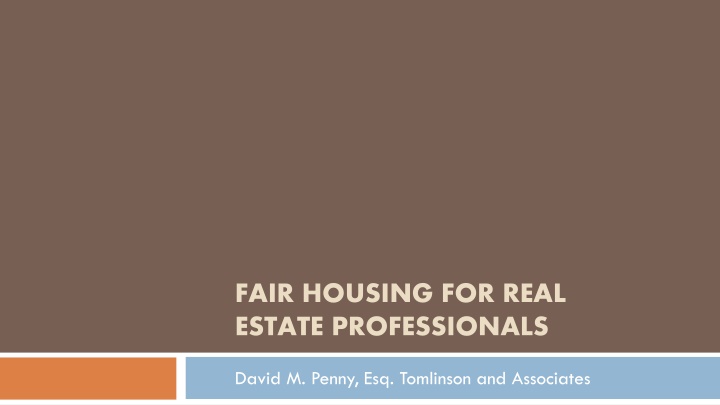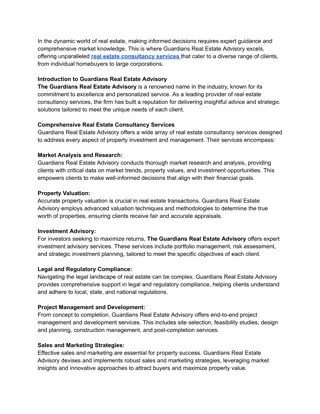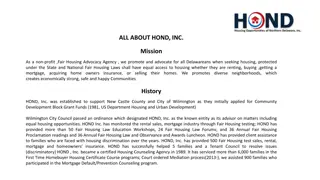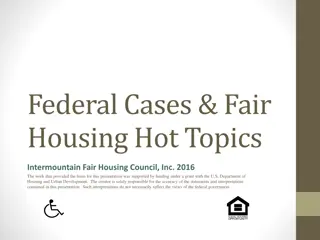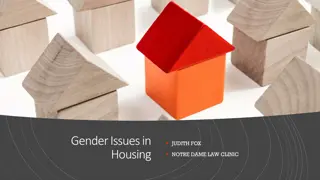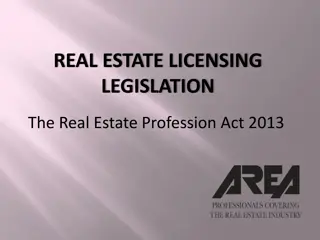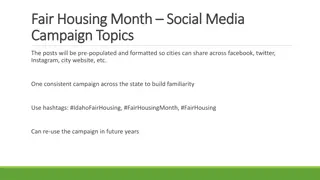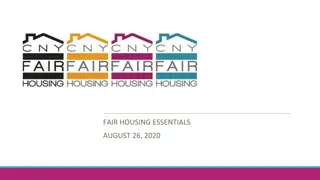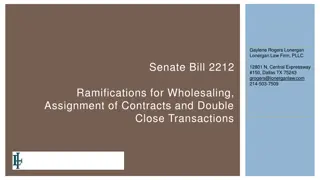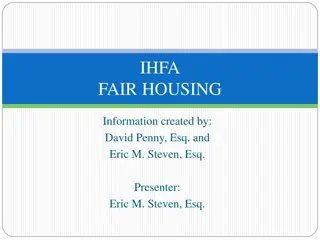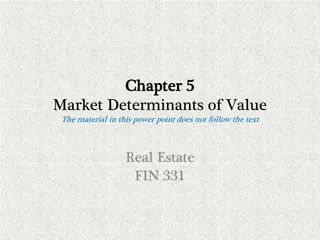Fair Housing Laws for Real Estate Professionals
Understanding and complying with fair housing laws is crucial for real estate professionals to ensure non-discriminatory practices. This presentation covers the protected classes, importance of compliance, and limitations on who must adhere to fair housing laws.
Uploaded on Sep 26, 2024 | 0 Views
Download Presentation

Please find below an Image/Link to download the presentation.
The content on the website is provided AS IS for your information and personal use only. It may not be sold, licensed, or shared on other websites without obtaining consent from the author.If you encounter any issues during the download, it is possible that the publisher has removed the file from their server.
You are allowed to download the files provided on this website for personal or commercial use, subject to the condition that they are used lawfully. All files are the property of their respective owners.
The content on the website is provided AS IS for your information and personal use only. It may not be sold, licensed, or shared on other websites without obtaining consent from the author.
E N D
Presentation Transcript
FAIR HOUSING FOR REAL ESTATE PROFESSIONALS David M. Penny, Esq. Tomlinson and Associates
Acknowledgement/Disclaimer "The work that provided the basis for this publication was supported by funding under a grant with the U.S. Department of Housing and Urban Development. The substance and findings of the work are dedicated to the public. The author and publisher are solely responsible for the accuracy of the statements and interpretations contained in this publication. Such interpretations do not necessarily reflect the views of the Federal Government."
Learning Objective By the end of this presentation, you will know how to provide real estate services in accordance with the Fair Housing Act.
Fair Housing is About Civil Rights Fair Housing laws are federal, state, and local laws that prohibit housing discrimination. It is ILLEGAL to treat a person differently in a housing transaction because the person is a member of a protected class. The Protected Classes are: Race Sex Gender Identity, Sexual Orientation Color Familial Status Religion Mental or Physical Disability National Origin
Why Fair Housing Compliance is a Priority It is the law. Noncompliance is a denial of Civil Rights. Noncompliance is expensive.
Limitations on Who Must Comply with Fair Housing Laws The Fair Housing Act does not apply to a private individual owner selling their own home following that; They do not own more than three single family homes There is no use of a real estate agent Advertising or notices are not discriminatory There have been no real estate sales within twenty-four months and the owner is not in the business of selling or renting dwellings
Limitations on Who Must Comply with Fair Housing Laws Requests for accommodation requirements do not apply to owner occupied buildings that have four or fewer dwelling units Fair Housing laws are not the Americans with Disabilities Act When the Fair Housing Act applies, compliance obligations extend to individuals and corporations (i.e.; real estate professionals, lenders and brokers)
Discriminatory Conduct Under Fair Housing Laws Refusing to rent, sell, or finance/denial of housing Refusing to give information, discouraging from renting/purchasing, or lying about availability Applying different rules, privileges, standards, and/or qualifications Variance in eviction/providing of services Making discriminatory statements (spoken or published)
Discriminatory Conduct Under Fair Housing Laws Steering to certain housing Harassing, intimidating, threatening, or coercing Refusing to let a person with a disability make modifications necessary to use the dwelling Refusing to make reasonable changes in rules, policies, practices, or procedures so that a person with a disability can have equal use of the dwelling
Fair Housing for Individuals with a Disability What does disability mean? Disability means a person with a physical or mental impairment which substantially limits one or more of the person s major life activities.
Laws that Apply to the Protection of Individuals with Disabilities The Fair Housing Act 42 USC 3601 et seq. Idaho Anti-Discrimination Statutes. Idaho Code 67-5902 et seq. Section 8, Rural Development Other laws apply if the housing is operated under a program that provides Federal assistance
Complying with the Law as a Real Estate Professional The agent s responsibility does not arise until the client discloses that they have a disability, or the disability is apparent Do not ask if someone has a disability or inquire into the type, nature, or extent of their disability or limitations The agent s goal is to overcome barriers that are disability related; You can ask How may I help you? You may ask (all clients) Do you have any special needs that I can help you with? Be vigilant for a request for accommodation
Requests for Accommodation or Modification An accommodation is a request for a change in rules, policies, practices, or services that may be necessary to afford a disabled person equal opportunity Clients with disabilities may request your assistance either verbally or in writing A modification is a change to a dwelling so that a person with a disability has an equal opportunity to use and enjoy it Generally, requests must be honored so long as the individual has a disability and establishes there is a connection between the request and the individual s ability to participate in a real estate transaction
Rules that Apply to Requests for Accommodation Real estate professionals must consider any reasonable accommodation request A request for accommodation can be verbal or in writing The real estate professional should grant the request unless; Doing so would create an undue financial or administrative burden, or Granting the request would fundamentally alter the nature of the professional s business Suggest an alternative accommodation if the one requested is not reasonable
Examples of a Reasonable Request for Accommodation Scheduling appointments for a specific time of day Flexibility in determining meeting locations Attendance of care providers Use of the client s disability adapted transportation Service/comfort animal Creating a video recording of parts of the house that are difficult to access Allowing client s contractor to inspect the house for possible modifications Magnification of small print documents Allowing a client to use a wheelchair, scooter, or a golf cart to view a property
Examples of an Unreasonable Request for Accommodation Physically carrying the client to overcome stairs/barriers Providing the client with a care provider Driving through landscaping to improve accessibility A request that places the real estate professional at physical risk A request that places the real estate professional or another person s property at risk of damage A request that would require the real estate professional to incur a substantial expense
Fair Housing for Families with Children What does the phrase familial status mean? Familial status means having a child under age 18 in the household, whether living with a parent, a legal custodian, or their designee. It also covers a woman who is pregnant, and people in the process of adopting or gaining custody of a child.
Fair Housing for Families with Children What action does the law prohibit? No one may deny housing, limit access to housing, discourage home seekers, or create different rules, fees, or standards because of the familial status of the household. This includes rentals, purchases, lending, advertising, and any other transaction within the housing industry.
Real World Examples A customer tells their listing agent, our neighbors like the neighborhood the way it is and have asked that we not sell to a family with teenagers, Hispanics, or Jews. We trust you will help us with that request. How would you respond?
Real World Examples An immigrant family from Somali hires you and you learn that three other families from Africa recently purchased homes in the same neighborhood where there is another home for sale. Do you let that information influence the location of homes you show this client?
Real World Examples Your client refuses to consider the best offer from a couple that is gay because he cannot stand the thought of gay people in the home he is selling. What do you tell your client?
Resources Additional Resources idahohousing.com/fair-housing fairhousingforum.org For more information: Follow us on Facebook: FairHousingForum IdahoHousing Bilingual Videos Follow us on Twitter @FairHouseForum @IdahoHousing YouTube Channel English language videos Spanish language videos
